Like many industries, the retail sector is dealing with a tight labor market right now.
But the biggest challenge for hiring managers isn’t so much finding enough job candidates for their retail roles, but how things work out once new hires are on the shop floor.
Poor quality of hire and high attrition rates are the real thorn in the side of the retail industry, and the source of the problem happens during the hiring process. If your selection process is broken, you’ll constantly hire the wrong people into your roles.
For example, a lot of retailers will rely purely on CVs and past work experience or out-of-the-box assessments to create candidate hiring profiles to fill job openings. Assessment results are also often interpreted manually, which leads to poor-fit hires who don’t have the necessary skills and also tend to not fit the company culture either.
And the outcome of this? You guessed it, the new hire leaves the job not long after onboarding.
Focusing on identifying the best candidates for your retail roles during the selection process will work out better in the long run for everyone involved. And to do this, a custom-designed candidate selection flow will be every hiring manager’s secret weapon.
What’s in?
Like what you see?
Don’t miss out. Subscribe to our quarterly digest to get the latest TA and TM resources delivered right to your inbox.
What skills should retail store employees have?
Before we take a look at how you can design your selection flow to assess for the skills that indicate a qualified candidate, what exactly are those skills you should be looking for in retail employees?
If we look at retailers such as grocery stores, department stores, and even warehouse retailers, most roles are considered entry-level because skill and ability matter much more than work experience to be good at these jobs. And the good news is, a lot of the skills needed to be a great candidate in retail are transferable soft skills that they easily possess even when they have no work experience.
So for example, how a candidate communicates, their personality, manners, enthusiasm, and energy are all crucial soft skills for retail roles as this can make or break a customer’s experience of your brand.
A CV isn’t going to tell you anything about how a candidate will behave in a customer-facing role. How will you know from a CV how a candidate is likely to perform under pressure or respond to stressful situations if you make them a job offer?
Aside from these customer-centric skills, you’ll also want to use your recruitment process to assess a candidate’s teamwork skills, how they respond to leadership and how easily they lose motivation when performing a task.
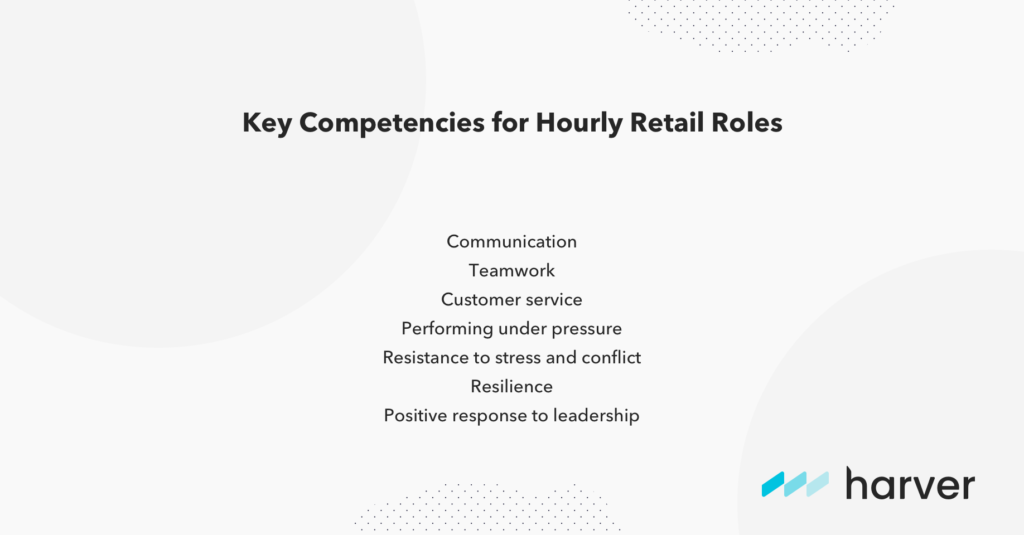
These are all important skills that you should look for in retail hiring but they are impossible to assess for without a custom candidate selection flow that’s specifically tailored to the retail job you’re hiring for.
And now the question is, how do you create a candidate selection flow that assesses candidates for these kinds of skills?
How to design your selection flow to assess retail skills
First, it’s important to highlight that the goal of the selection process in retail is not to assess individual candidate skills to understand their profile, but to identify those candidates who fit your specific roles and company culture. In other words, you’re not assessing candidates with the purpose of getting to know them better, but with the purpose of screening them in.
This is why out-of-the-box assessments and random combinations of tests don’t work as a recruitment strategy. When you choose standard assessments, you’re getting to know the general traits of a candidate and who or how they are as a person, but you end up having to guess whether they’d be a good fit for a specific role and culture.
The right way to select candidates for retail roles is to start with a job task analysis to thoroughly assess and understand what skills and characteristics the job you’re hiring for requires. Your analysis will help ensure your job description is up to scratch, and then you can use your selection process to find candidates who have the skills required to perform well in that role.
So in a nutshell, once you know what job skills you need for that specific retail role, you can design a custom assessment to measure for those exact skills.
Using out-of-the-box assessments also isn’t good for your recruitment strategy because they often lead to linear hiring processes that can’t adapt to fluctuating labor markets. For example, if your process is designed to filter out all candidates who don’t pass certain criteria, you’ll see your job application volumes going down. And this is the last thing you need in a labor shortage!
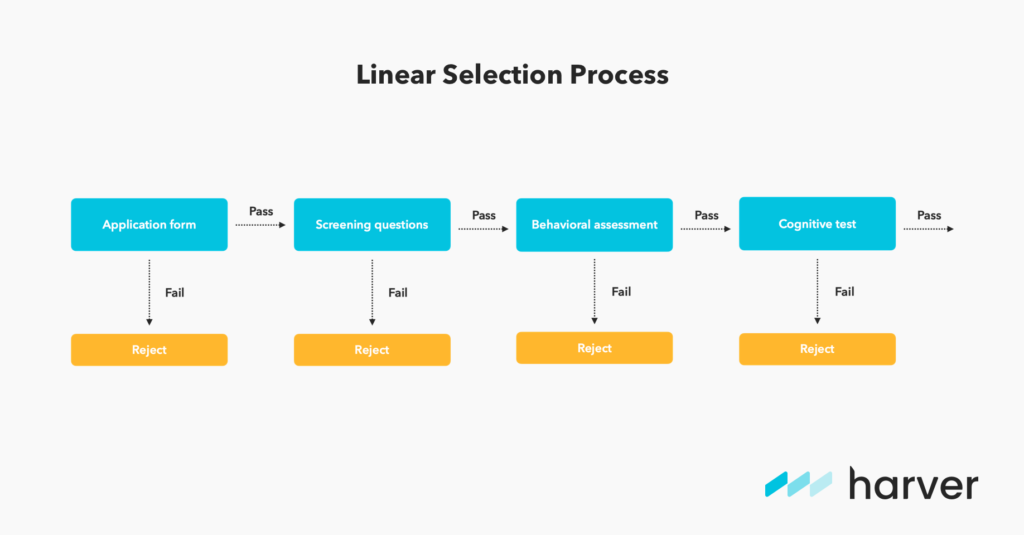
To prevent this from happening, you want to think of assessments more in terms of matching rather than filtering: A candidate might not have the skills that make them a match for one particular role, but could they be a match for a different role that requires a different skillset? This way of thinking is crucial to making the most of your candidate pool in high-volume hiring.
With the right recruitment technology behind you, you’ll be able to assess candidates for a whole variety of different skills and focus on where they’re best placed rather than where they fall short.
Creating a custom selection flow rather than a standard assessment also gives you the opportunity to really tailor the interview process to the job so candidates get a truer picture of what the job entails.
For example, you could include a job simulation or virtual job tryout that would give candidates a sneak peek into the day-to-day of the job. Not only will this create a positive candidate experience that engages the candidate in the application process, but it also ensures there are no misaligned expectations if the candidate becomes a new hire.
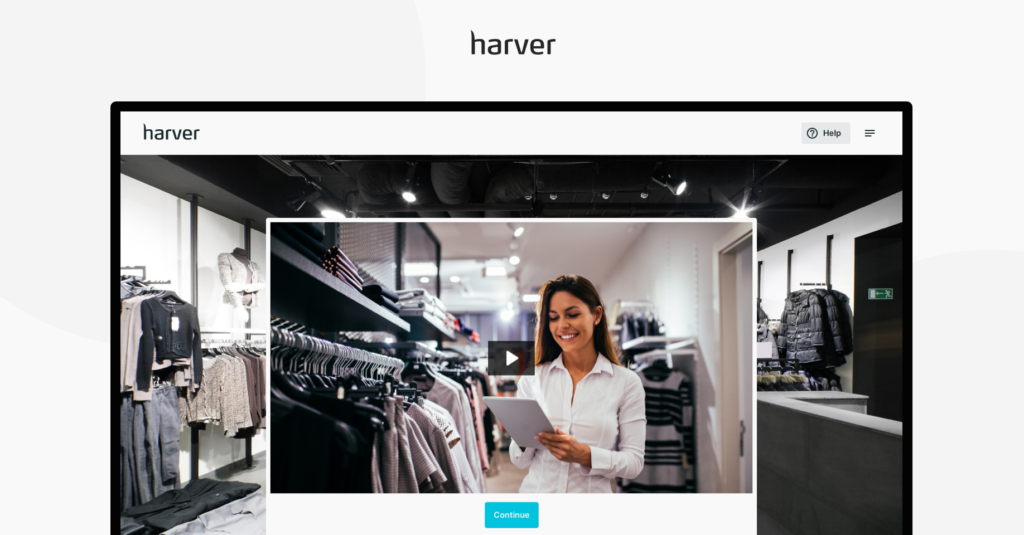
When the candidate starts their new retail job, they already have a good idea of what it entails, which has been proven to reduce employee turnover rates substantially.
Next, let’s take a look at what your custom candidate selection flow might look like when hiring retail candidates.
Example candidate selection flow for retail roles
Now that we know standard assessments don’t work for selecting right-fit retail candidates, and that you need a candidate selection flow that’s designed specifically for your roles, you might be wondering: What does a good candidate selection flow for retail roles actually look like in practice?
The most basic but highly effective selection flow would be something along the lines of:
Personal information – availability and work preferences – SJT – live video interview – hiring decision
While personal information, availability and work preferences, and the hiring decision stages would be standard, the other stages in the flow should be customized depending on what skills you’re looking for in that particular new hire.
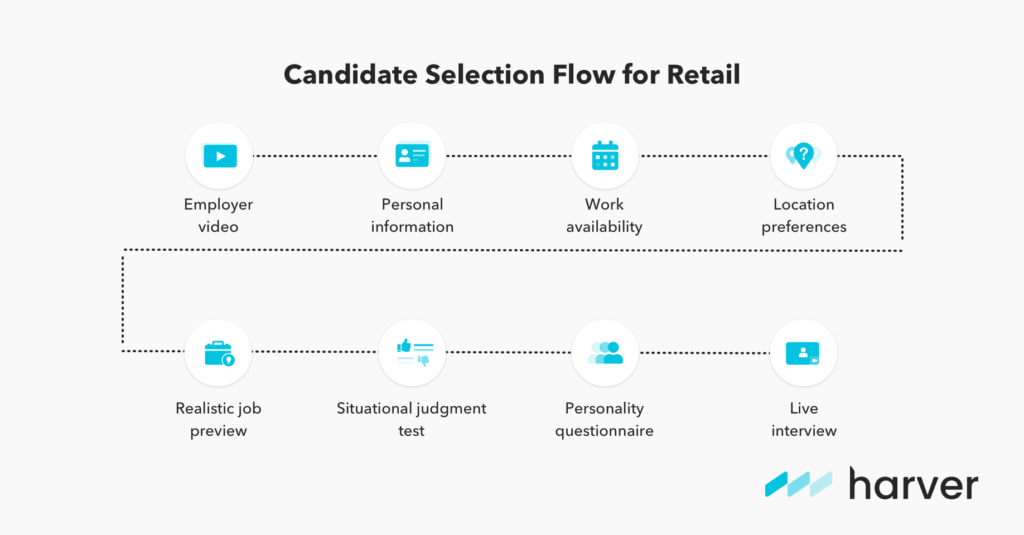
Here are a few example stages you might want to consider adding to your selection flow depending on what skills you’re recruiting for:
- SJTs – Situational judgement tests are a useful pre-employment assessment for retail candidates. They involve presenting candidates with job-specific scenarios to see how they respond. SJTs will help you assess overall fit and whether the candidate has the necessary behavioral tendencies for the job.
- Personality questionnaires – If the role requires some strong selling skills (for example, if you’re hiring for a sales associate in a higher-end store) a personality questionnaire will tell you whether the candidate fits the culture and values of your company.
- Language skills test – If you’re an international retailer, you may need a language skills test included in your flow if your employees need to speak a particular or multiple languages to be considered for the role.
- Cognitive ability assessment – If you’re hiring for roles that require multitasking and coordination, a cognitive ability assessment will allow you to assess candidates for skills like perceptual speed and accuracy. This is important in roles where they need to order, sort, verify information and work under pressure.
- Live or video interview – If you don’t have the resources for live, synchronistic two-way video interviews in your hiring process, a one-way recorded video interview can tell you a lot about the energy and enthusiasm of the candidate, which is important in any customer-facing role.
If you’d like to see how Haver can transform your hiring process,
book a demo here!
How to know if your selection process is working
The only way to know if your selection process is working is to continually gather and analyze your recruitment data. So, before you create your custom selection flow, set out some clear goals that, if reached, will tell you if your selection process is doing what you need it to do.
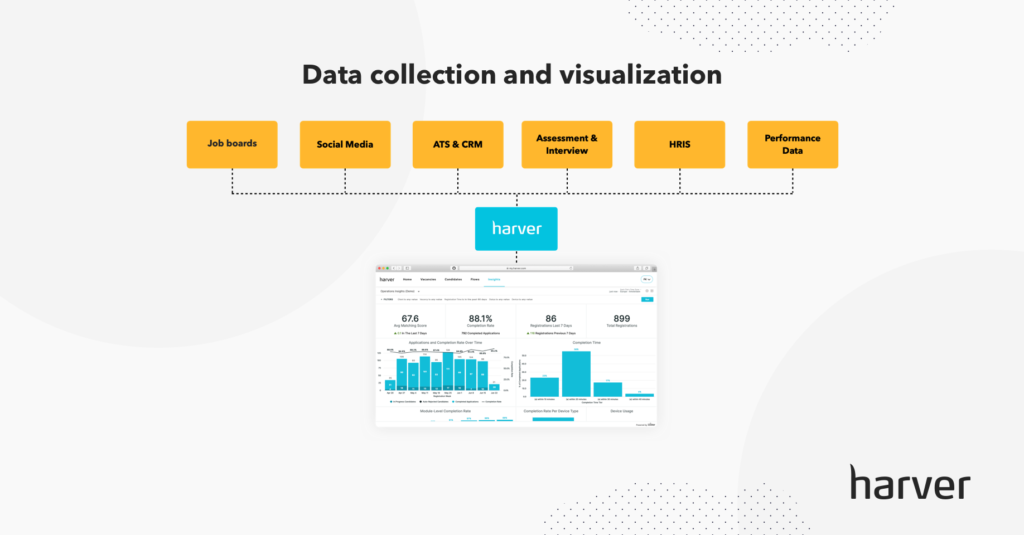
Goals that indicate a successful candidate selection process in retail would include things like:
- reduced attrition rate,
- increased quality of hire,
- shorter time to hire,
- reduced hiring manager input,
- data-driven hiring decisions
Deciding which goals are important to your business prior to hiring means you’ll focus on the right data and you’ll have KPIs to work towards that tell you what you need to know about your custom selection process and its effectiveness.
For example, if you’re doing one-click applications for your roles or relying on CVs only, you might think that the selection flow is not effective when you see that a high percentage of applicants drop off after a personality questionnaire or SJT.
But candidates dropping off after a particular stage is helpful because it disqualifies poorly-fitting candidates for that particular role. It also reduces the workload on store managers, who can focus on interviewing candidates who are right for the role they’re hiring for.
If your hiring KPIs aren’t satisfactory or don’t improve after you implement a custom flow, then you can start thinking about process adjustments. Building your custom selection flow with Harver will allow you to unlock data insights through a powerful BI solution.
The more data you have, the better decisions you’ll make, so it’s important to continually adjust your process according to the data until your selection flow is working as effectively and efficiently as possible.
Next steps
If you’re struggling to hire the right candidates into your retail roles, Harver’s recruitment software solution for retailers could be exactly what your business needs.
Book a demo to learn more about how building custom candidate selection flows through Harver can transform your hiring process and fill your organization with right-fit candidates who stay happy in their jobs for longer.
Ready to transform your hiring process?


